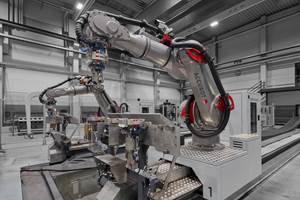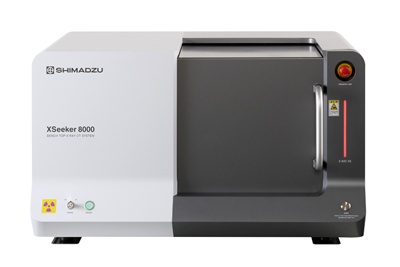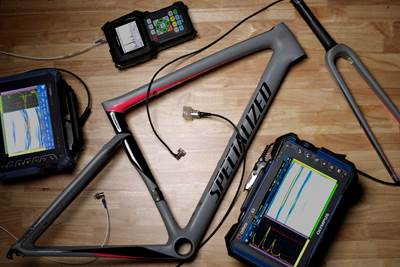Precision universal testers optimize materials testing, analysis
CAMX 2024: Fast and flexible AGX-V2 Series by Shimadzu provides more intelligent operability for testing tasks, supporting composites, plastics, metals and finished products.
Share
Source | Shimadzu Scientific Instruments
Shimadzu Scientific Instruments (Columbia, Md., U.S.) offers a wide range of high-quality instruments for fast, reliable composites testing. A key part of this portfolio is the AGX-V2 Series. Available in a range of sizes, these universal testing systems feature control technology that ensures optimal functionality and high-speed data sampling — enabling the detection of sudden changes in samples during testing — and reduced maintenance tasks. The systems require a single load cell to operate, to save time on calibration and spend less money on load cell replacements.
The AGX-V2 is available in tabletop models with frame capacity up to 50 kN (11,000 lbf) and floor models with frame capacity up to 600 kN (135,000 lbf). Ultra high-speed (10 kHz) data sampling and crosshead control (1kHz) enable precise stress and strain control, while a modular control unit allows expansion of data acquisition inputs (20 max), sensor outputs (20 max) and digital control outputs.
An intelligent crosshead enhances operability and adds additional safety precautions to protect hardware and users. The AGX-V2’s multi-joint feature also connects the jigs to load cells. It enables all jigs — including tensile, compression and bending jigs — to be quickly and easily connected. This means that it’s longer necessary to replace heavy joints, which simplifies the replacement of test jigs. A small-capacity load cell can be connected directly to the tip, so tests with small-capacity load cells can be performed with a large-capacity load cell still attached.
Moreover, the series’ use of Trapezium X-V software provides a user-friendly interface that enables fast and simple analysis, particularly when performing single-direction tests, such as tensile, compression and bending tests. The software can also run endurance tests that involve the repeated application of force. The software system’s versatility supports the analysis of many materials types, including composites, plastics, metals and finished products.
A precision alignment system and software allow users to achieve Class 10 alignment or better. A wide range of jigs and other accessories enable combined loading compression, mixed mode bending, open hole compression and shear testing, among others.
Related Content
-
Aurora reveals latest SPRINT X-Plane design concept
An Aurora and Boeing team advances its high-speed, vertical lift concept to the preliminary design phase, which features three lift fans, a more refined composite exterior and an uncrewed cockpit.
-
Proving thermoplastic composites match carbon fiber/epoxy performance in road bikes
CDCQ, LxSim, Addcomp and Argon 18 collaborate to optimize a carbon fiber/PA6 bike seat post, democratizing AFP and demonstrating materials and process for future designs and production.
-
Automated robotic NDT enhances capabilities for composites
Kineco Kaman Composites India uses a bespoke Fill Accubot ultrasonic testing system to boost inspection efficiency and productivity.
Related Content
Aurora reveals latest SPRINT X-Plane design concept
An Aurora and Boeing team advances its high-speed, vertical lift concept to the preliminary design phase, which features three lift fans, a more refined composite exterior and an uncrewed cockpit.
Read MoreProving thermoplastic composites match carbon fiber/epoxy performance in road bikes
CDCQ, LxSim, Addcomp and Argon 18 collaborate to optimize a carbon fiber/PA6 bike seat post, democratizing AFP and demonstrating materials and process for future designs and production.
Read MoreAutomated robotic NDT enhances capabilities for composites
Kineco Kaman Composites India uses a bespoke Fill Accubot ultrasonic testing system to boost inspection efficiency and productivity.
Read MoreActive core molding: A new way to make composite parts
Koridion expandable material is combined with induction-heated molds to make high-quality, complex-shaped parts in minutes with 40% less material and 90% less energy, unlocking new possibilities in design and production.
Read MoreRead Next
Shimadzu XSeeker 8000 is designed for simplicity
The new user-friendly XSeeker 8000 benchtop X-ray CT system enables high functionality with a small footprint.
Read MoreMachine, equipment investment strengthens Ruckus Composites’ research, innovation
CNC services expansion, universal testing machines and advanced inspection enable Ruckus to delve deeper into the study and evaluation of carbon fiber damage, as well as nondestructive and destructive testing.
Read MoreUltrasonic welding for in-space manufacturing of CFRTP
Agile Ultrasonics and NASA trial robotic-compatible carbon fiber-reinforced thermoplastic ultrasonic welding technology for space structures.
Read More









